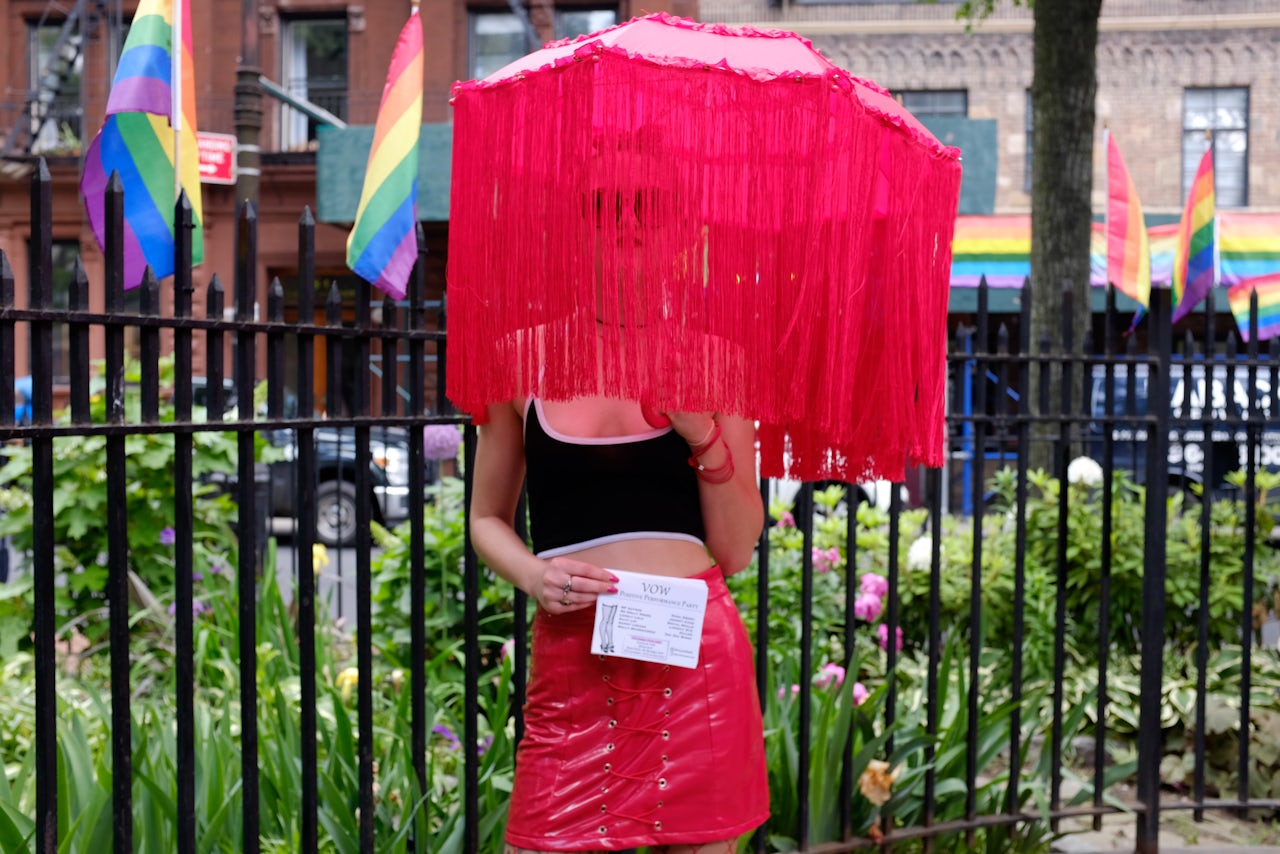Around 2 p.m. last Saturday, a tiny park in the West Village across the street from the Stonewall Inn filled with red umbrellas. Standing beneath them, shielded from blazing sun, were over 200 sex workers and their allies. Usually wary of appearing publicly in association with their jobs, today they were unafraid. After all, it was International Whores’ Day.
Every year on the second of June, thousands of people across the world take over streets and public squares to demand respect for sex work. It’s a commemoration of a 1975 protest in Lyon, France, where sex workers rallied in a church against police brutality and their precarious working conditions. “They occupied the church for eight days before being brutally broken up and beaten by the police, but in the meantime started a conversation around sex worker rights that continues today,” said Kaitlyn Bailey, a former sex worker who hosts The Oldest Profession, a podcast about sex-work history.
In the U.S., full-service sex work (or, as the law calls it, prostitution) is illegal in every state but Nevada. So is “procurement,” or facilitating sex work, as well as living off the proceeds of sex work. “There’s a dangerous mystery around the work that we do because of criminalization,” said Red S., one of the organizers of the rally.
Thanks to strict enforcement of these laws and a cultural discomfort with sex, rallies in the U.S. are usually modest. “We can’t have conversations about our working conditions, and it keeps people in the shadows,” Red added, “particularly people who have ‘straight’ jobs or live in conservative areas.” But, they said, Saturday’s action was the biggest they’d ever seen. People were fired up, and it was largely because of a package of bills that passed over President Trump’s desk on April 11: the Stop Enabling Sex Traffickers Act (SESTA) and the Allow States and Victims to Fight Online Sex Trafficking Act (FOSTA), which were written to hold sites like Backpage and Craigslist accountable for the “promotion or facilitation of prostitution,” even via third-party content.
Listen above for an audio version of this story, complete with audio from the march and interviews.
Sex workers say the change is putting their jobs in jeopardy. “Post-SESTA, I got fucked over pretty bad,” said Simone, who has been a full-service sex worker for the past year. “I went almost a month without making a single dollar. Nothing has filled the void Backpage left behind.”
Presented as a solution to supposedly rampant online child sex trafficking, the bills were an easy sell in a deeply divided Congress: only 25 representatives and two senators voted nay. Many sex workers, though, feared that the outcome instead would be to take away crucial tools that sex workers have relied on for years to make their work safer, driving both consensual sex work and the very trafficking the bills would supposedly combat further underground.
“I started working when I was seventeen – I left home, an abusive situation, and I actually started on Backpage,” said Tyler, a 23-year-old sex worker who attended the rally. “It was the only way that someone at my financial status could screen in any way. It was the only way I could keep from having to step outdoors to see clients.” “Outdoors” meaning “on the street” — where 80 percent of sex workers experience violence, incidents that police rarely take seriously.
The community’s fears immediately came true: two days after FOSTA/SESTA’s March 21 passage, Craigslist voluntarily shut down its personals section. Five days before Trump signed the bills into law in April, the Department of Justice raided Backpage. Some sex workers also shut down their own sites, and most switched from common email clients like Gmail to Protonmail, an encrypted service. At Saturday’s rally, one organizer told the crowd a sex worker friend had been assaulted just days before by a new client she was unable to screen. “I’ve had to carry around mace and a taser now, which I don’t want to [do],” said Charlie King, an escort of 10 years. “But guys honestly could choke me; I could be robbed by other women or by pimps. It’s wild wild west out here, and it’s really endangering our lives.”
Hers was a common story on Saturday, but despite the sobering context, the mood was festive. The rally brought together friends who rarely saw each other or had never met offline, many of whom had met recently through anti-FOSTA activism. People wore costumes and laughed together as they drew signs with messages like “No Bad Whores, Only Bad Laws” and “The Only Good Cop Is A Stripper Cop.” By around 3 p.m. the crowd had outgrown the park, and organizers announced a three-block march to Washington Square, with marshals from the Democratic Socialists of America blocking street intersections. Marchers chanted: “Sex workers, survivors, united” and “Hey hey, ho ho, FOSTA/SESTA’s got to go.” At the iconic arch, they formed a circle to listen to a series of speakers who called out not only FOSTA and SESTA for endangering sex workers, but also police raids like the one that killed massage parlor worker Yang Song late last year in Queens.
For longtime activists like Ceyenne Doroshow, who runs trans sex worker advocacy organization GLITS, this increase in enforcement is leading history to repeat itself. At the most risk, as always, are the trans sex workers of color who she supports. “Over the past nine years, I’ve buried girls. I’ve had to call parents and tell them their children are dead,” she told The Outline after speaking to the crowd. “This law affects all of us. It literally ruins lives. It literally forces people into harm’s way. If the government was worried about trafficking, here is a prime example of creating it.”
Around 4:30, as the sunlight cooled off, the red umbrellas began to come down. People hugged and in many cases wiped away tears. One was Lorelei Lee, an adult film performer and activist, who had been in D.C. the previous day speaking with legislators. “People often come to me for help when they need a lawyer or some kind of support, and as soon as these bills passed, I was overwhelmed with requests. People were so scared,” she said. For her, Saturday was another kind of overwhelming: like many who attended the rally, she said she’d never seen such a show of force from sex workers. “And you know what? I’m hopeful,” she added. “I really am.”
Zoë produced an audio version of this story, complete with audio from the march and interviews. Listen above or in your favorite app below.
Pocket Casts / Overcast / Stitcher / TuneIn / Alexa / Anchor / 60 dB / RadioPublic / RSS / “OK Google, play news from The Outline.”







